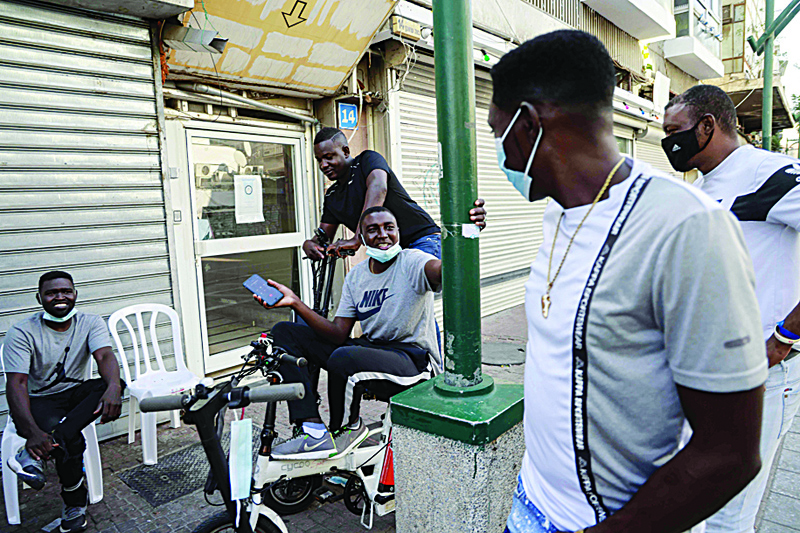
TEL AVIV: Sudanese asylum seekers living in Israel fear being kicked out once ties are normalized between the two countries, though some hope their presence will be seen as an advantage. Technically at war with Israel for decades, Sudan on Friday became the third Arab country this year to announce it is normalizing ties with the Jewish state, following the United Arab Emirates and Bahrain in August.
But since the announcement, members of the Sudanese community in Israel have been "very afraid" of being sent back, said 26-year-old Barik Saleh, a Sudanese asylum seeker who lives in a suburb of Tel Aviv. Israel counts a Sudanese population of around 6,000, mostly asylum seekers. Thousands of others left or were forced to return after Sudan split in 2011 when South Sudan won its independence-only for the fledgling country to plunge into civil war.
Some of the Sudanese-often labeled as "infiltrators" for crossing illegally into Israeli territory before being granted permission to stay-were minors when they arrived. They are not always allowed to work, and they cannot gain Israeli citizenship. Saleh, who grew up in West Darfur, was just nine when his family fled war to neighboring Chad. "My parents are in a refugee camp," said the young man, who arrived after journeying through Libya and Egypt, and has lived in Israel for 13 years. "I will be the first one for normalization," he said. "But if I will be deported from here, then I will be in 100 percent danger," he added.
'Not safe to go back'
Former president Omar al-Bashir oversaw Sudan's civil war in the Darfur region from 2003. Some 300,000 people died in the conflict and 2.5 million were forced from their homes. Bashir, in detention in Khartoum, is wanted by the International Criminal Court over charges of genocide, war crimes and crimes against humanity in Darfur. "We are here because it is not safe to go back to Sudan yet," said 31-year-old Monim Haroon, who comes from a stronghold region of Darfuri rebel leader Abdelwahid Nour's Sudan Liberation Movement (SLM) faction.
"The reason why we are here in Israel is not because of the lack of a diplomatic relationship between Sudan and Israel, but because of the genocide and ethnic cleansing that we went through," Haroon said. Sudan's transitional government, in place after the fall of Bashir in 2019, signed a landmark peace deal with an alliance of rebel groups earlier this month. But Nour's rebel faction was not one of them. Some of those in power in Sudan today were also in control under Bashir.
They include Mohamed Hamdan Daglo, vice president of Sudan's ruling transitional sovereign council. He heads the feared Rapid Support Forces, long accused by human rights groups of committing widespread abuses in Sudan's Darfur provinces. "For me it is very dangerous," said Haroon, who was previously head of Nour's office in Israel. "Unless Abdelwahid signs a peace agreement, I cannot go back."
'Second home'
In Neve Shaanan, a suburb of Tel Aviv known for its asylum seeker community, stalls and restaurants offer Sudanese food, including a version of the popular bean dish "foul", served with grated cheese. Usumain Baraka, a smartly dressed 26-year-old who works nearby, has finished a master's degree in public policy at a university in Herzliya, north of Tel Aviv. Like Saleh, he too was nine when he fled Darfur for Chad, where his mother still lives in a refugee camp. "They (militiamen) killed my dad and my big brother, and they took everything we had in the village," Baraka said. "At one point I had two options: to go back to Darfur to fight for a rebel group, or leave the camp and try to have a normal life."
While the young men who AFP spoke to expressed fear that their presence in Israel would be at risk under the normalization agreement, some said they would like the Jewish state to see it as an asset rather than a burden. Haroon said Sudanese in Israel could be a "bridge" between the countries, not only in the private sector, but to also to help build understanding between the two peoples. "I hope the Israeli government will see this potential asset, the important role that we can bring promoting the interest of the two countries," he said.
Both Sudan and Israel have said in recent days that migration would be one of the issues on the agenda during upcoming meetings on bilateral cooperation. "Israel is my second home," said asylum seeker Saleh. "There is no language that I speak better than Hebrew, even my own local language." But Jean-Marc Liling, an Israeli lawyer specialized in asylum issues, warned that with the normalization announcement, the return of Sudanese asylum seekers would likely be on the government's radar. "The first thing that comes to the government's mind is: we'll be able to send back the 'infiltrators'," Liling said.- AFP
.jpg)



